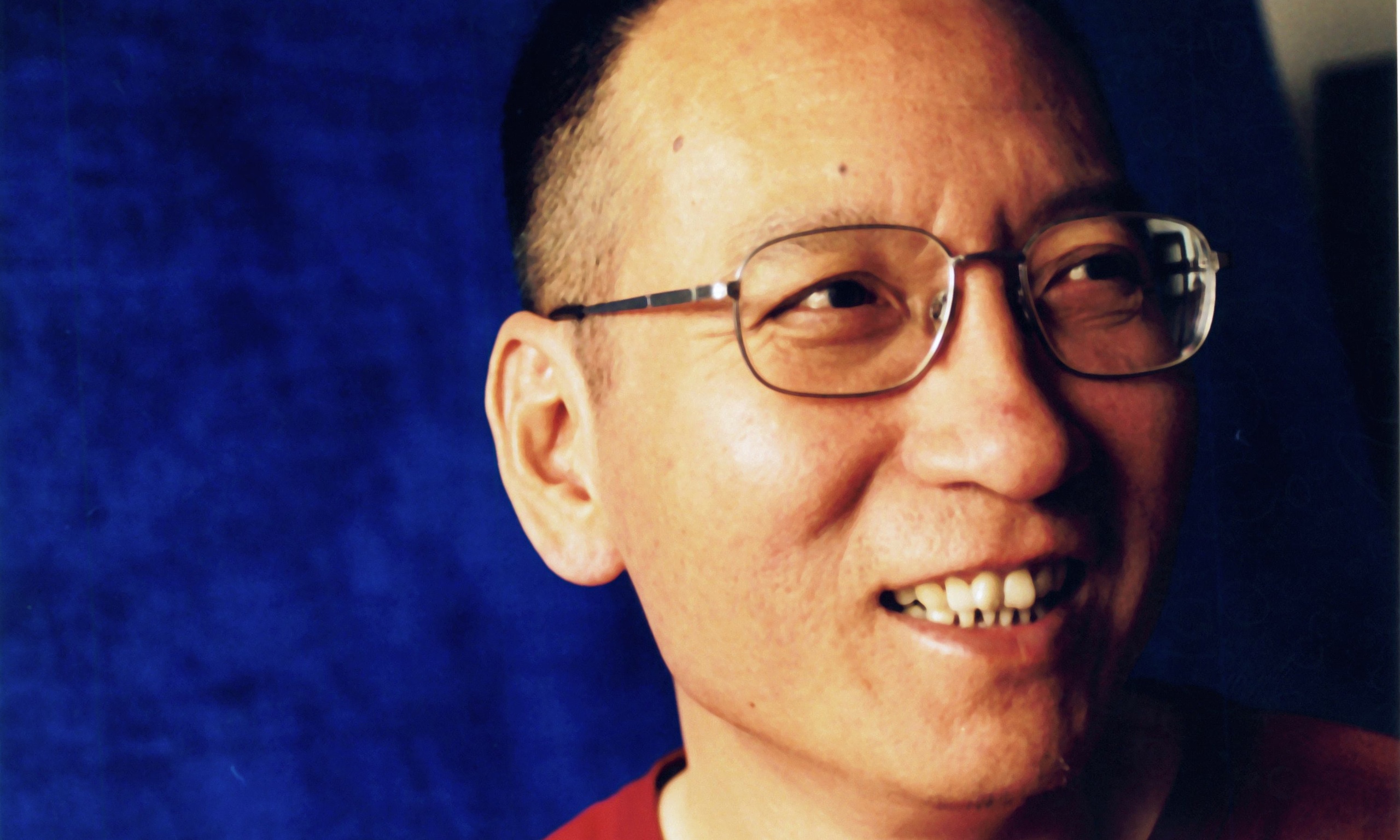A Tale of Two Nobel Laureates

The night former President Barack Obama hosted Chinese premiere Xi Jinping for a dinner of lamb, lobster and pudding at the White House, his fellow Nobel Peace Prize laureate Liu Xiaobo ate his 1,949th plate of noodles behind bars.
It was September 25, 2015 and Liu, a pro-democracy writer, was halfway through an 11-year sentence, serving the longest prison term in Chinese history on charges of “subversion of state power”.
Prosecuted under former Chinese premiere Hu Jintao for his peaceful yet critical writings on China’s government, Liu’s punishment has withstood six years of international protest.
His 2010 Nobel award elevated Liu to the worldwide renown of South African leader Nelson Mandela and scientist Albert Einstein. But it has only worsened his treatment in China, and endangered the lives of his family and friends, according to the human rights organizations monitoring his case.
On the evening of the Nobel Peace Prize ceremony in Oslo, one of Liu’s closest friends, writer Yu Jie, was kidnapped by Chinese agents. He was stuffed into a black bag and driven to a nearby suburb, where he was tortured for hours because of his friendship with Liu.
The same day, Liu’s brother-in-law was charged with an identical 11-year prison term. His wife, artist Liu Zia, is being kept under house arrest in virtual solitary confinement, denied most medical treatment while her physical and mental state rapidly deteriorates, according to friends and advocacy groups monitoring her condition.
Liu’s call for political reforms and the end of Communist single-party rule “were considered so grave that even under the more liberal Hu government, he was considered an embarrassment so serious that he was going to pay a high price,” said Bob Dietz, Asia program coordinator for the Committee to Protect Journalists, a non-profit media advocacy organization.
THE PARTY’S MOUTHPIECE
With 44 journalists in its prisons in 2014, China has the highest number on record since the CPJ began publishing data.
China’s government has imposed one of the most restrictive media environment’s in the world.
Freedom House ranked it as recently as October 2015 as the last of 65 nations in openness, also citing new restrictions on Internet access.
China says the restrictions are meant to eliminate dangerous rumors and silence political dissent. Having taken effect in October 2015, the law subjects those who “deliberately spread [false information] on information networks or other media” or take other actions seen as “seriously disrupting social order” to a prison term of up to three years.
Under former president Hu Jintao, in power from 2002 to 2012, journalists and other writers were able to use social media to bypass the more formal censorship mechanism, Dietz said. Though they were caught on occasion, the punishment, he said, was “seldom jail.”
Investigative journalism and political commentary like Liu’s focused on the Chinese government has been under greater attack following President Xi’s ascent to power in March 2013.
“We have a red line,” a former investigative journalist for Beijing-based newspaper Southern Weekly, who asked not to be identified for fear of government retribution, said in an interview. “Journalists completely avoid the topic of political reform.”
Stuart Leavenworth, former chief of McClatchy’s now-closed Beijing bureau, said in an interview that these red lines have been extended to restrict even foreign journalists based in China.
“It’s very clear that Xi has created new red lines that [cannot be] crossed,” Leavenworth said. “[He] has been much more hardline.”
These increased restrictions signal an alarming regression for China, Dietz said.
“Under Xi, it has been made clear that the role of the media is to support the party’s unilateral rule, and nothing less,” Dietz said. “It’s pretty much a return to being the party’s mouthpiece.”
WRITER IN EXILE
Take a seat in Yu Jie’s Fairfax, Virginia, living room, and the eye is immediately drawn to the gray-scale abstract painting hanging above a couch in the Chinese writer’s home in exile.
The piece, composed of delicately overlapping marbled swirls, was a gift to Yu’s wife from one of her best friends – artist Liu Xia, the imprisoned Nobel laureate’s wife.
“We are very close,” Yu said of the couples in an interview.
It was this relationship that led the Chinese government to crack down on Yu and his wife. After his house arrest and later torture – which he said left him so badly injured that doctors told him he would have died had medical treatment been delayed even an hour – the couple fled to the United States in 2012 with their young son.
“For the Chinese government it was a sham,” Yu said of their treatment. “Because Liu was already in prison and they couldn’t find someone else to spread their anger, they picked me.”
Yu first became acquainted with Liu in 1998 following the publication of Yu’s first book, “Fire and Ice,” a collection of essays critiquing Chinese society.
“Liu made a call to me to criticize the book,” Yu said with a laugh. “He was very straightforward.”
Straightforwardness was one of the qualities Yu admired most in his friend, he said.
“He is unlike most Chinese people – hesitant to tell their feelings or even fake,” Yu said. “If he doesn’t like something, he says so.”
SPEAKING HIS MIND
Frankness is a quality that has defined Liu’s career.
Originally a professor of literature, Liu began criticizing the Chinese government in speeches. He worked briefly as a guest lecturer in the United States. By 1987, he published his first book, a criticism of Chinese society.
Though this was enough to draw the government’s attention, it wasn’t until three years later that Liu received his first prison sentence for participating in the student protests at Tiananmen Square. Liu escaped unscathed, but felt personally responsible for the deaths of those he had worked with, Yu said.
“Most of the participants are proud of what happened, but Liu felt it was a lifelong burden,” Yu said. “He was very guilty about it.”
His guilt motivated Liu to continue speaking out, Yu said.
“He was the survivor,” Yu said. “He will devote all his life to fighting for freedom.”
Liu spent the next two decades advocating for a more open and democratic China. He published more than 800 essays and used the Internet to broadcast his demands that authorities comply with Article 38 of the Chinese Constitution which gives citizens access to “freedom of speech, of the press, of assembly, of association, of procession and of demonstration.”
Despite his outspokenness, Liu managed to escape more serious punishment until 2008, when he co-authored the widely distributed manifesto known as “Charter 08,” which called for political and legal liberalization.
Two days before the manifesto was released, government officials detained Liu and brought him to an undisclosed location where he was held for six months. In June 2009, official Chinese media announced that the writer had been formally arrested, charged with “inciting subversion of state power” and sentenced to 11 years in prison.
“Before him, no one’s sentence had passed 10 years,” Liu’s lawyer, Mo Shaoping, said in an interview. “His case is the most severe.”
Now locked in a cell several hours from his Beijing home, Liu has been able to share little about his prison experience.
He is allowed few visitors and they are prohibited from publicizing their conversations with him.
According to Yu, a phone call between Liu Xia and Yu’s wife was cut off within milliseconds after his wife uttered the words “Liu Xiaobo.”
“Those who visit him are forbidden to tell anything about him,” Yang Jianli, founder of Initiatives for China and organizer of a petition to free Liu, said in an interview.
AWARD OR PUNISHMENT?
On December 10, 2010, over a thousand people from more than 49 different countries gathered in Oslo to honor the recipient of the 2010 Nobel Peace Prize. Liu was not among them. The award cited his “long and non-violent struggle for fundamental human rights in China.”
“Pure and simple: the message was that China would not bow to pressure to liberalize,” Dietz said of Liu’s absence.
The blue velvet chair meant for Liu stood empty. Chinese officials would not allow his wife to attend the ceremony either.
“I have a passport, but I’m not allowed to leave my residence,” she told the Economic Times in 2010. “And if I do make it to Norway, will they allow me back into China?”
In his keynote speech, Prize committee chariman Thorbjørn Jagland said that this behavior by the Chinese government, which also demanded that other countries boycott the ceremony, only reinforced the award’s importance.
“He is in isolation in a prison in northeast China,” Jagland said. “This fact alone shows that the award was necessary and appropriate.”
But the backlash against the international recognition that came with the award may have worsened conditions for Liu and others in prison, Dietz said.
“Honestly, Liu’s imprisonment made the human rights environment worse,” he said. “There was a liberal outcry that was ignored, and when the outcry continued it was beaten back.”
According to the United Nations, over 120 cases of house arrest, travel restriction, and other acts of intimidation were committed by Chinese officials following the award’s announcement.
His wife, already under government surveillance, was put on permanent house arrest after the event. She has also been cut off from all forms of communication with the outside world – her phone and Internet disconnected – she was threatened with the imprisonment of her brother, Liu Hiu, should she fail to cooperate.
This threat materialized in 2013 when Liu Hiu was sentenced to 11 years in prison for committing fraud. It’s widely believed that, given the absence of sufficient proof, the charges were fabricated in an attempt to target Liu Xiaobo, his lawyer Shaoping told the Guardian newspaper.
When Liu’s wife was temporarily allowed contact with journalists and lawyers at her brother’s April 2013 trial, she took the opportunity to communicate a simple message; “If people say I am free, tell them that I am not free.”
“In China, political prisoners’ families would be more or less harassed,” Shaoping said. “But what Liu Xia encountered was too much. She’s the only one under this severe illegal house arrest.”
Six years later, Liu Xia remains imprisoned in her own home. Her mental and physical health has rapidly deteriorated and she has been denied access to medical treatment.
“This is an egregious case as she is a normal citizen,” Jianli said. “Even the Chinese government has not come up with any legal reason to find her guilty for anything.”
This practice of abusing family and friends to retaliate against activists in prison is becoming more common, Leavenworth said.
“What the government’s been doing a lot more lately is putting the family under house arrest to prevent them from travelling,” Leavenworth said.
AN OUTCRY IGNORED
Earlier this year, more people saw Liu Xia’s face than have for the last half a century.
During President Xi’s first U.S. visit in September, he led a summit of world leaders at the United Nation’s headquarters. Hanging from the walls of the glass lobby of the United States Mission, just across the street from the gathering, was a larger-than-life poster of Liu’s wife.
With a population of more than 1 billion and over $2 trillion in exports, China is rapidly becoming the largest and most economically powerful country in the world.
“China is perhaps the most important state actor in the entire world,” Chanan Weissman, spokesman for the U.S. Department of State’s Bureau of Democracy, Human Rights and Labor, said. “You cannot ignore them. It’s a very complicated, convoluted relationship we have as a result.”
Most world leaders prefer to take a non-public approach to China’s human rights record.
Sophie Richardson, China director for Human Rights Watch, said bolder ultimatums may be necessary to effect greater change.
“When other governments have attached clear and negative consequences to behavior on China’s part, that’s prompted a reply,” she said. “The Chinese government is an extremely transactional regime.”
For proof of this, the international community should look to the U.S. handling of its cybersecurity issues with the nation, Richardson said.
After a series of Chinese hackings of various U.S. companies, Obama decided to take decisive action. Obama and Xi agreed in September 2015 that “neither country’s government will conduct or knowingly support cyber-enabled theft of intellectual property,” according to a White House fact sheet.
In a joint press conference with Xi, Obama announced that he had “indicated that it had to stop.” As a result, the “two countries have reached a common understanding on the way forward.”
Human rights advocate said that the United States, whose economy is increasingly intertwined with China’s, bears the burden of responsibility for Liu’s continued improvement.
Jianli and other critics say the fact that Obama is a fellow Nobel laureate gives him the unique obligation to help free Liu.
Leavenworth and others can’t say for sure why the issue of Liu’s imprisonment and the plight of those in similar situations hasn’t been raised more publicly.
“If the prisoner is in a country like China that the U.S. has a relationship with, it’s a double-edged sword,” Maziar Bahari, a journalist who was imprisoned in Iran, said. “On the one hand, the U.S. has more leverage but at the same time, there are financial and strategic interests that may take the priority, and U.S. diplomats may not want to bring military action with that country by putting pressure on political prisoners.”
Former Secretary of State John Kerry has released statements “strongly urging” Chinese authorities to release Liu and his wife.
In response, the Chinese foreign ministry issued a statement saying that “China’s 1.3 billion people have the best right to talk about the country’s rights.”
U.S. legislators have hosted events, written letters, and even proposed that the plaza in front of the Chinese embassy in Washington be renamed in recognition of Liu.
“Will we be silent, eager to enjoy the economic benefits of cooperation with the PRC?” Ted Cruz, the Senator and former presidential candidate who proposed the renaming, said in September. “Or will we put President Xi on notice that for America, human rights are no longer ‘off the table’?”
Richardson believes that more must be done.
“Other Nobel Peace Prize winners in prison have been let out in part because the rest of the world raised the price on the military regime to keep them in,” Richardson said. “They haven’t done that in Liu’s case.”
Campaign
About this Site
Pressuncuffed.org seeks to encourage and promote rigorous student reporting, scholarly research and debate on the role of, and obstacles to, independent journalism in the United States and abroad. Our website features reporting by University of Maryland students about press freedom in the United States and abroad. It also offers resources to instructors elsewhere who may want to teach classes or hold workshops on this theme. In the near future, this site will become a place for student work from around the country and abroad.
Dana Priest, two-time Pulitzer Prize winner at The Washington Post and Knight Chair in Public Affairs Journalism at the University of Maryland.


